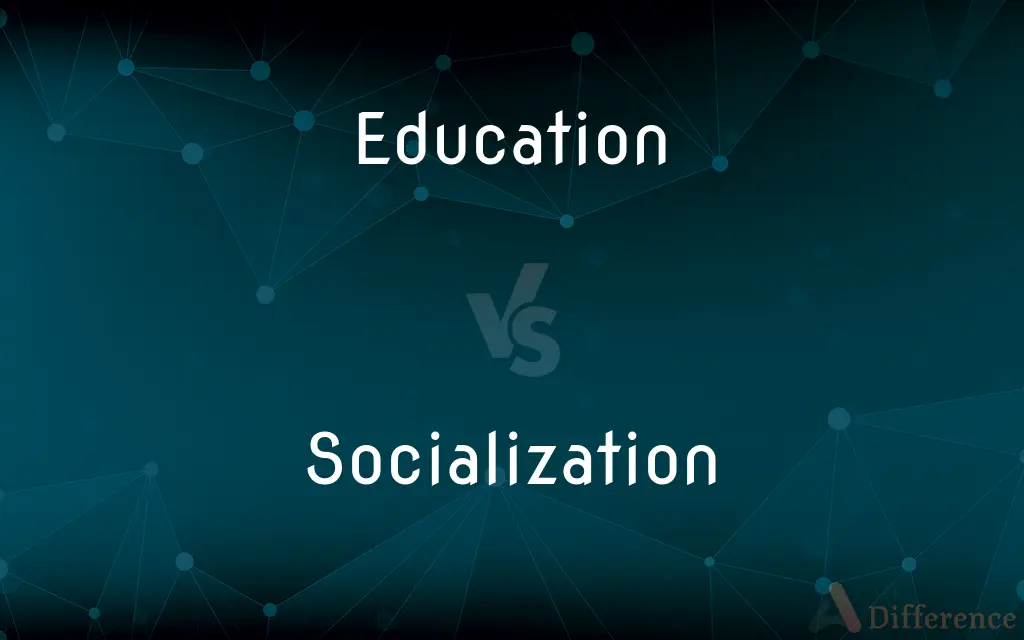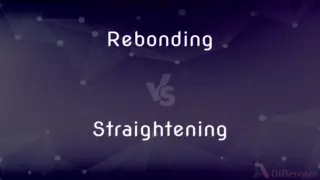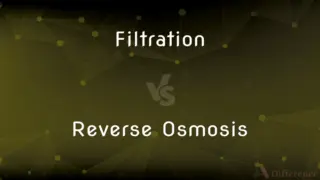Education vs. Socialization — What's the Difference?
Edited by Tayyaba Rehman — By Fiza Rafique — Published on December 13, 2023
Education is a systematic instruction in academic and life skills. Socialization is a process of learning norms, values, and behaviors in social contexts.

Difference Between Education and Socialization
Table of Contents
ADVERTISEMENT
Key Differences
Education and Socialization are both essential components in the development of an individual. Education typically refers to the systematic instruction and training in various subjects, ranging from mathematics and science to history and literature. It often takes place in formal settings like schools, colleges, and institutions, aiming to impart knowledge and skills to individuals.
Socialization, on the other hand, is the process through which individuals learn and internalize the norms, values, and behaviors of their society or group. While Education is more structured and curriculum-based, Socialization is more fluid, occurring through interactions with family, peers, media, and other societal agents. It shapes an individual's social identity, beliefs, and behavior patterns.
It's worth noting that while Education and Socialization can occur separately, they often intersect. For example, schools not only provide academic knowledge but also serve as a primary site for Socialization. In classrooms, students learn not just about subjects but also how to interact with peers, understand societal norms, and function as part of a group.
Conversely, Socialization can also be educational. When interacting with family members or peers, individuals can learn essential life skills, moral lessons, and cultural knowledge. So, while Education is primarily about gaining knowledge and skills, and Socialization is about understanding societal norms and behaviors, the two are intertwined in many ways.
In essence, Education and Socialization are complementary processes. While Education focuses on the acquisition of knowledge and skills, Socialization emphasizes understanding and adapting to societal norms and behaviors. Both are crucial for an individual's holistic development and integration into society.
ADVERTISEMENT
Comparison Chart
Primary Focus
Systematic instruction
Learning norms and behaviors
Setting
Schools, colleges, institutions
Family, peers, media, community
Outcome
Knowledge and skills acquisition
Social identity and behavior patterns
Structure
Structured and curriculum-based
Fluid and based on interactions
Agents
Teachers, instructors, mentors
Family, peers, media, cultural influences
Compare with Definitions
Education
A means to acquire knowledge and skills.
With proper Education, one can achieve great things.
Socialization
Influenced by culture, family, and media.
Media plays a significant role in modern Socialization.
Education
Often takes place in formal settings.
She received her Education from a renowned university.
Socialization
Shapes an individual's social identity.
Through Socialization, children learn their roles in society.
Education
Guided by a curriculum or syllabus.
The Education system follows a set curriculum.
Socialization
Vital for understanding one's position in society.
Socialization helps individuals integrate into their communities.
Education
The process of receiving systematic instruction.
Education is vital for personal and societal growth.
Socialization
The process of learning societal norms and behaviors.
Socialization begins at home and continues throughout life.
Education
The act or process of educating or being educated.
Socialization
Often occurs through interactions with others.
Playdates are essential for a child's Socialization.
Education
The knowledge or skill obtained or developed by a learning process.
Socialization
To place under government or group ownership or control
Socialized medical care.
Education
A program of instruction of a specified kind or level
Driver education.
A college education.
Socialization
To cause to accept or behave in accordance with social norms or expectations
Techniques to socialize aggressive children.
Education
The field of study that is concerned with the pedagogy of teaching and learning.
Socialization
To take part in social activities
Likes to socialize with people her age.
Education
An instructive or enlightening experience
Her work in an animal shelter was a real education.
Socialization
The process of learning how to live in a way acceptable to one's own society, said especially about children.
Socialization skills are important things to learn in kindergarten.
Education
(uncountable) The process of imparting knowledge, skill and judgment.
Good education is essential for a well-run society.
Socialization
The act of interacting with others, of being social.
Forced socialization rarely creates strong friendships, but there are exceptions.
Education
(countable) Facts, skills and ideas that have been learned, especially through formal instruction.
He has had a classical education.
The educations our children receive depend on their economic status.
Socialization
Taking under government control as implementing socialism.
Education
The act or process of educating; the result of educating, as determined by the knowledge skill, or discipline of character, acquired; also, the act or process of training by a prescribed or customary course of study or discipline; as, an education for the bar or the pulpit; he has finished his education.
To prepare us for complete living is the function which education has to discharge.
Socialization
The action of establishing on a socialist basis;
The socialization of medical services
Education
The activities of educating or instructing or teaching; activities that impart knowledge or skill;
He received no formal education
Our instruction was carefully programmed
Good teaching is seldom rewarded
Socialization
The act of meeting for social purposes;
There was too much socialization with the enlisted men
Education
Knowledge acquired by learning and instruction;
It was clear that he had a very broad education
Socialization
The adoption of the behavior patterns of the surrounding culture;
The socialization of children to the norms of their culture
Education
The gradual process of acquiring knowledge;
Education is a preparation for life
A girl's education was less important than a boy's
Education
The profession of teaching (especially at a school or college or university)
Education
The result of good upbringing (especially knowledge of correct social behavior);
A woman of breeding and refinement
Education
The United States federal department that administers all federal programs dealing with education (including federal aid to educational institutions and students); created 1979
Education
Encompasses academic, vocational, and life skills training.
Education isn't just about books; it's about life skills too.
Common Curiosities
Can Socialization occur without formal interactions?
Yes, Socialization can happen through media, observation, and indirect interactions.
Is school the only place for Education?
No, Education can occur in various settings, including online platforms and real-world experiences.
Does Socialization only happen during childhood?
No, Socialization is a lifelong process, occurring at all stages of life.
Is Education solely academic?
No, Education encompasses academic, vocational, and life skills training.
Can an individual be educated but not socialized?
Yes, an individual can receive Education but might lack understanding or adherence to societal norms.
Are textbooks the only tools for Education?
No, Education can utilize various tools, including digital platforms, practical experiences, and mentorship.
Do Education and Socialization overlap?
Yes, schools and institutions often serve as sites for both Education and Socialization.
Is Socialization only about learning societal norms?
No, it's also about understanding one's role, building relationships, and developing a social identity.
Can Education occur without a teacher?
Yes, self-guided learning and experiences can also provide Education.
Are online platforms valid for Education?
Yes, online platforms offer diverse educational resources and opportunities.
Do Education and Socialization have lifelong benefits?
Yes, both contribute to personal development, societal integration, and overall well-being.
How does Education impact a society?
Education fosters critical thinking, innovation, and informed citizens, leading to societal progress.
Can Socialization be negative?
Yes, if one internalizes harmful norms or behaviors, Socialization can have negative effects.
How does culture impact Socialization?
Culture shapes the norms, values, and behaviors that individuals learn during Socialization.
Is family the primary agent of Socialization?
While family plays a significant role, other agents like peers, media, and community also influence Socialization.
Share Your Discovery

Previous Comparison
Rebonding vs. Straightening
Next Comparison
Filtration vs. Reverse OsmosisAuthor Spotlight
Written by
Fiza RafiqueFiza Rafique is a skilled content writer at AskDifference.com, where she meticulously refines and enhances written pieces. Drawing from her vast editorial expertise, Fiza ensures clarity, accuracy, and precision in every article. Passionate about language, she continually seeks to elevate the quality of content for readers worldwide.
Edited by
Tayyaba RehmanTayyaba Rehman is a distinguished writer, currently serving as a primary contributor to askdifference.com. As a researcher in semantics and etymology, Tayyaba's passion for the complexity of languages and their distinctions has found a perfect home on the platform. Tayyaba delves into the intricacies of language, distinguishing between commonly confused words and phrases, thereby providing clarity for readers worldwide.












































